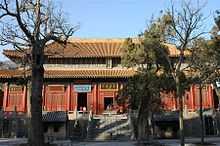Mount Song (Mount Sung; Chinese: 嵩山; pinyin: Sōng Shān; Wade–Giles: Sung1 Shan1; literally "lofty mountain"), also known in Chinese as Song Shan, is a culturally significant mountain in China. It is the "Central Great Mountain" (中嶽/中岳) among the Five Great Mountains and located in Henan province on the south bank of the Yellow River. Its summit is 1,500 meters above sea level.
Geography
Songshan is made up of several mountains that rise to 1500 m in the Dengfeng district of Henan Province.[1] It has 36 peaks and stretches 60 kilometers, composed of Taishi Mountain and Shaoshi Mountain. The highest peak is 1494 meters above sea level. The seven peaks of Song Shan stretch for 64km between the cities of Luoyang and Zhengzhou. The slopes rise steeply from the valley and are thickly clad with trees, giving them an impressive appearance, but the highest peak (Junji) reaches only 1500m in altitude.[2]
Religious Structures

The Zhongyue Temple
The mountain is one of the sacred Taoist mountains of China, and contains important Taoist temples such as the Zhongyue Temple; however the mountain also features a significant Buddhist presence.[3] It is home to the Shaolin Temple, traditionally considered the birthplace of Zen Buddhism, and the temple's collection of pagoda forest is the largest in China. The Zhongyue Temple is also located here, one of the earliest Taoist temples in the country. The Songyang Academy nearby was one of the four great academies of ancient China. The mountain and its vicinity are populated with Taoist and especially Buddhist monasteries. The 6th century Songyue Pagoda is also located here, as well as Tang Dynasty (618–907) pagodas within the Fawang Temple. Eight locations at the foot of the mountain in Dengfeng have been a World Heritage Site since 2010.[4]
Songshan Stratigraphic Structure National Geopark
The Shaolin Monastery is located within the geopark. Three major orogenies formed the area: the Songyang Orogeny of 2.5 billion years ago, the Zhongyue Orogeny of 1.85 billion years ago, and the Shaolin Orogeny of 570 million years ago. They were named after local attractions in the area. The Songshan Geopark is also called “the textbook of geological history”.
See also
- International Network of Geoparks
- List of Geoparks
Notes
References
- Goossaert, Vincent. "Songshan." in Fabrizio Pregadio, ed., The Encyclopedia of Taoism (London: Routledge, 2008), 917-918.
|
|---|
| | | | General | |
|---|
| | Geography | |
|---|
| | Education | |
|---|
| | Culture |
- Zhongyuan Mandarin
- Yuju Opera
|
|---|
| | Cuisine | |
|---|
| | Visitor attractions | |
|---|
| |
|
|
|---|
| | Five Great Mountains | |
|---|
| | Four Sacred Buddhist Mountains | |
|---|
| | Four Sacred Taoist Mountains | |
|---|
|


